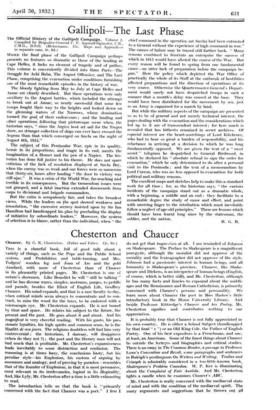Gallipoli—The Last Phase
The Official History of the Gallipoli Campaign. Volume 2. Compiled by Brigadier-General C. F. Aspinall-Gglander, C.B., C.M.G., D.S.O. (Heinemann. 15s. Maps and Appendices in separate case, ts. 6d.) Wilma the final phase of the Gallipoli Campaign perhaps presents no features so dramatic as those of the landing at Cape Helles, it lacks no element of tragedy and of pathos. This volume is conveniently divided into three Parts--The Struggle for Achi Baba, The August Offensive, and The Last Phase, comprising the evacuation under conditions furnishing one of the most remarkable episodes in the history of war. The bloody fighting from May to July at Cape Helles and Anzac are clearly described. But these operations were only auxiliary to the August battles, which included the attempt to break out at Anzac, so nearly successful that some few troops fought their way to the heights and looked down on he gleaming waters of the Narrows, whose domination formed the goal of their endeavours ; and the landing and other operations following that picturesque scene when, the historian says, "since the Argive host set sail for the Trojan shore, no stranger collection of ships can ever have crossed the Aegean than that which converged on Suvla on the night of August 6th, 1915."
The suliject of this Peninsular War, epic in its quality, heroic in its proportions, and tragic in its end, merits the ituagination of a Homer and the pen of a Napier. The his- torian has done full justice to his theine. Ile does not spare criticism of the tack Of resolution displayed at Suvla Bay, when the enmity was so weak and our forces were so numerous that thirty-six, hours after landing " the door to victory was still ajar." It was a crisis of the World War, far-reaching and terrible in its consequences. But the tremendous issues were not grasped, and a fatal inaction extended downwards from corps to divisional and brigade commanders.
But the critic is scrupulously fair, and takes the broadest views. While the leaders on the spot showed weakness and irresolution; " the excessive secrecy insisted upon by Sir Ian Hamilton had handicapped his plan by precluding the display of initiative by subordinate leaders." Moreover, the system of seleetionis to blame, rather than the individual, when " the
chief command in the operatioh (at Suvla) had been entrusted to a General without the experience of high command in war." The causes of failure may be traced still farther back. " Many reasons combined to frustrate an enterprise the success of which in 1915 would have altered the course oft he War. But every reason will be found to spring from one fundamental causean utter lack of preparation before the 'campaign be- gan." Here the policy Which depleted the War Office of practically the whole of its Staff at the outbreak of hostilities affected preparations and the direction of operations at its very source. Otherwise the Quartermaster-General's Depart- ment would surely not have despatched troops in such a manner that a month's delay was caused at the base. They would have been distributed for the movement by sea, just as an Army is organized for a march by land.
But while the military aspects of the campaign are presented so as to he of general and not merely technical interest, the pagesdealing with the evacuation and the considerations which
led up to it are of transcendent interest ; for here 11 is revealed that has hitherto remained in secret archives. Of especial interest are the .heart-searchings of Lord Kitchener, who had to bear so great a burden of responsibility, and his reluctance in arriving at a decision to which he was long
fundamentally opposed: We are given the text of EL" t secret " telegram he despatched to General Birdwood, iu which he declared his " absolute refusal to sign the order for evacuation," which he only determined to do after is personal visit to the Peninsula ; and the text of a memorandum by Lord Curzon, who was no less opposed to evacuation for both political and military reasons.
• The excellent maps and sketches help to make this a standard work for all time ; for, as the historian says, " the various incidents of the campaign stand out as a dramatic whole; with a beginning, a middle and an end ; they facilitate to a remarkable degree the study of cause and effect, and point with unerring finger to the retribution which must inevitably follow a neglect of age-old principles." These am lessons Which should have been learnt long since by the statesman, the soldier, and the nation. R. G. 13.






































 Previous page
Previous page